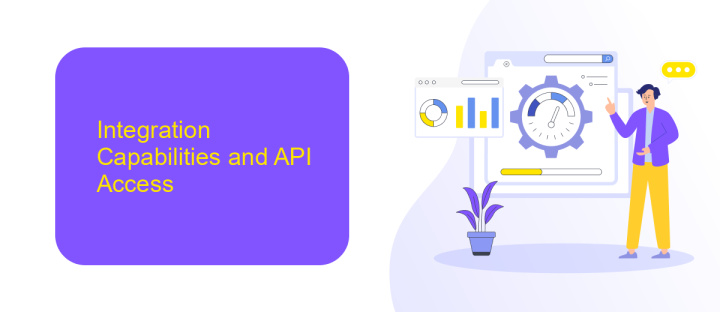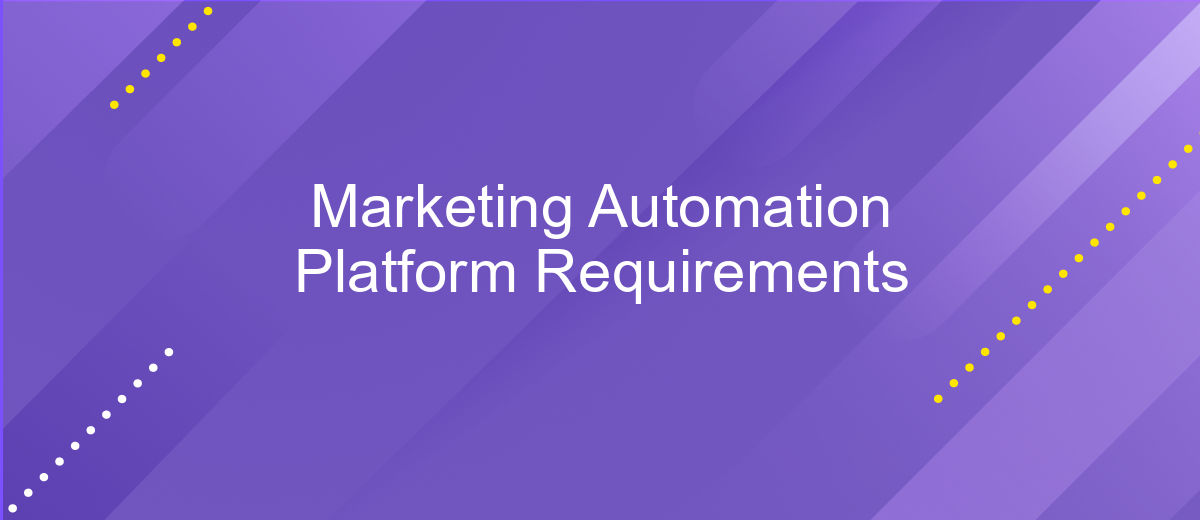Marketing Automation Platform Requirements
In today's fast-paced digital landscape, businesses must streamline their marketing efforts to stay competitive. Marketing automation platforms have become essential tools for achieving this efficiency. However, selecting the right platform requires a clear understanding of specific requirements and features. This article explores the key criteria that businesses should consider when evaluating marketing automation platforms to ensure they align with their strategic goals and drive optimal results.
Essential Features of a Marketing Automation Platform
A robust marketing automation platform is crucial for streamlining marketing efforts and enhancing customer engagement. To achieve this, the platform must include several essential features that cater to various marketing needs and facilitate seamless operations.
- Lead Management: Efficiently capture, nurture, and score leads to improve conversion rates.
- Email Marketing: Automate personalized email campaigns to engage with your audience effectively.
- Analytics and Reporting: Provide insights into campaign performance and customer behavior.
- CRM Integration: Seamlessly integrate with CRM systems to ensure consistent data flow and customer insights.
- Social Media Management: Automate and manage social media campaigns to enhance brand presence.
- Segmentation and Targeting: Allow precise audience segmentation for targeted marketing efforts.
By incorporating these features, a marketing automation platform can significantly boost efficiency and effectiveness. Businesses can better understand customer journeys, optimize marketing strategies, and ultimately drive growth. Selecting a platform with these capabilities ensures that marketing teams can focus on creative and strategic tasks, rather than being bogged down by manual processes.
Integration Capabilities and API Access

In today's digital landscape, seamless integration capabilities are crucial for any marketing automation platform. These platforms must offer robust API access to ensure they can easily connect with other tools and services within an organization's tech stack. This integration allows for the efficient transfer of data, enabling marketers to streamline workflows, enhance targeting, and improve overall campaign performance. A well-designed API facilitates the automation of tasks and processes, reducing the need for manual intervention and minimizing errors. As businesses increasingly rely on diverse applications to manage their operations, the ability to integrate these systems effortlessly becomes a key differentiator.
Platforms like ApiX-Drive provide a valuable solution for managing integrations, offering a user-friendly interface to connect various applications without requiring extensive technical expertise. By leveraging such services, businesses can quickly set up and manage integrations, ensuring data flows smoothly between different systems. This capability not only saves time but also empowers marketing teams to focus on strategic initiatives rather than getting bogged down in technical details. As a result, organizations can achieve a more cohesive and efficient marketing operation, driving better results and maximizing return on investment.
Scalability and Performance Requirements

In today's fast-paced digital landscape, a marketing automation platform must be equipped to handle scalability and performance challenges effectively. As businesses grow and their customer base expands, the platform should seamlessly accommodate increased data volumes and user interactions without compromising on speed or efficiency. Ensuring high availability and minimal downtime is crucial for maintaining customer engagement and satisfaction.
- Support for large data volumes: The platform should manage extensive datasets efficiently, ensuring quick data retrieval and processing.
- High user concurrency: It must handle multiple users accessing the system simultaneously without performance degradation.
- Load balancing: Implementing load balancing techniques is essential to distribute workloads evenly across servers, preventing bottlenecks.
- Scalable architecture: The platform should offer a flexible architecture that allows for easy scaling, both vertically and horizontally, to accommodate growth.
- Performance monitoring: Continuous monitoring tools should be in place to detect and resolve performance issues proactively.
By focusing on these scalability and performance requirements, businesses can ensure their marketing automation platform remains robust and efficient, even as demands increase. This adaptability not only enhances operational efficiency but also provides a seamless experience for end-users, ultimately driving better marketing outcomes and customer satisfaction.
Security and Compliance Considerations

When selecting a marketing automation platform, security and compliance are critical factors that must not be overlooked. Ensuring that the platform adheres to industry standards protects both your organization and your clients' data from potential breaches and legal issues. A secure platform builds trust and enhances your brand's reputation.
Compliance with relevant regulations, such as GDPR or CCPA, is essential for avoiding hefty fines and maintaining customer trust. The platform should offer features that facilitate compliance, such as data encryption, user consent management, and audit trails. These features help ensure that your marketing practices align with legal requirements.
- Data encryption to protect sensitive information.
- Role-based access controls to limit data exposure.
- Regular security audits and updates.
- Comprehensive logging for transparency and accountability.
By prioritizing security and compliance, your organization not only safeguards its operations but also fosters a trustworthy relationship with its audience. Choose a marketing automation platform that integrates these considerations seamlessly, ensuring a robust and legally compliant marketing strategy.
Vendor Selection and Implementation Process
Choosing the right marketing automation platform requires a thorough vendor selection process. Begin by identifying your organization's specific needs and objectives, ensuring that potential vendors align with these requirements. Evaluate vendors based on criteria such as functionality, scalability, ease of use, and customer support. Conduct demonstrations and request case studies or references to gain insights into their performance in similar industries. It’s also crucial to consider the platform’s integration capabilities with existing systems, ensuring seamless data flow and operational efficiency.
Once a vendor is selected, the implementation process should be meticulously planned and executed. Develop a comprehensive implementation roadmap that includes timelines, resource allocation, and key milestones. Engage stakeholders from relevant departments to ensure alignment and address potential challenges early. Tools like ApiX-Drive can facilitate the integration process, allowing for efficient and automated data transfer between your marketing automation platform and other business applications. Regular training sessions and support from the vendor will help your team maximize the platform's potential, ensuring a smooth transition and long-term success.
FAQ
What are the key features to look for in a marketing automation platform?
How can a marketing automation platform improve lead nurturing?
What integrations are important for a marketing automation platform?
How can small businesses benefit from marketing automation?
What are the challenges in implementing a marketing automation platform?
Apix-Drive will help optimize business processes, save you from a lot of routine tasks and unnecessary costs for automation, attracting additional specialists. Try setting up a free test connection with ApiX-Drive and see for yourself. Now you have to think about where to invest the freed time and money!

